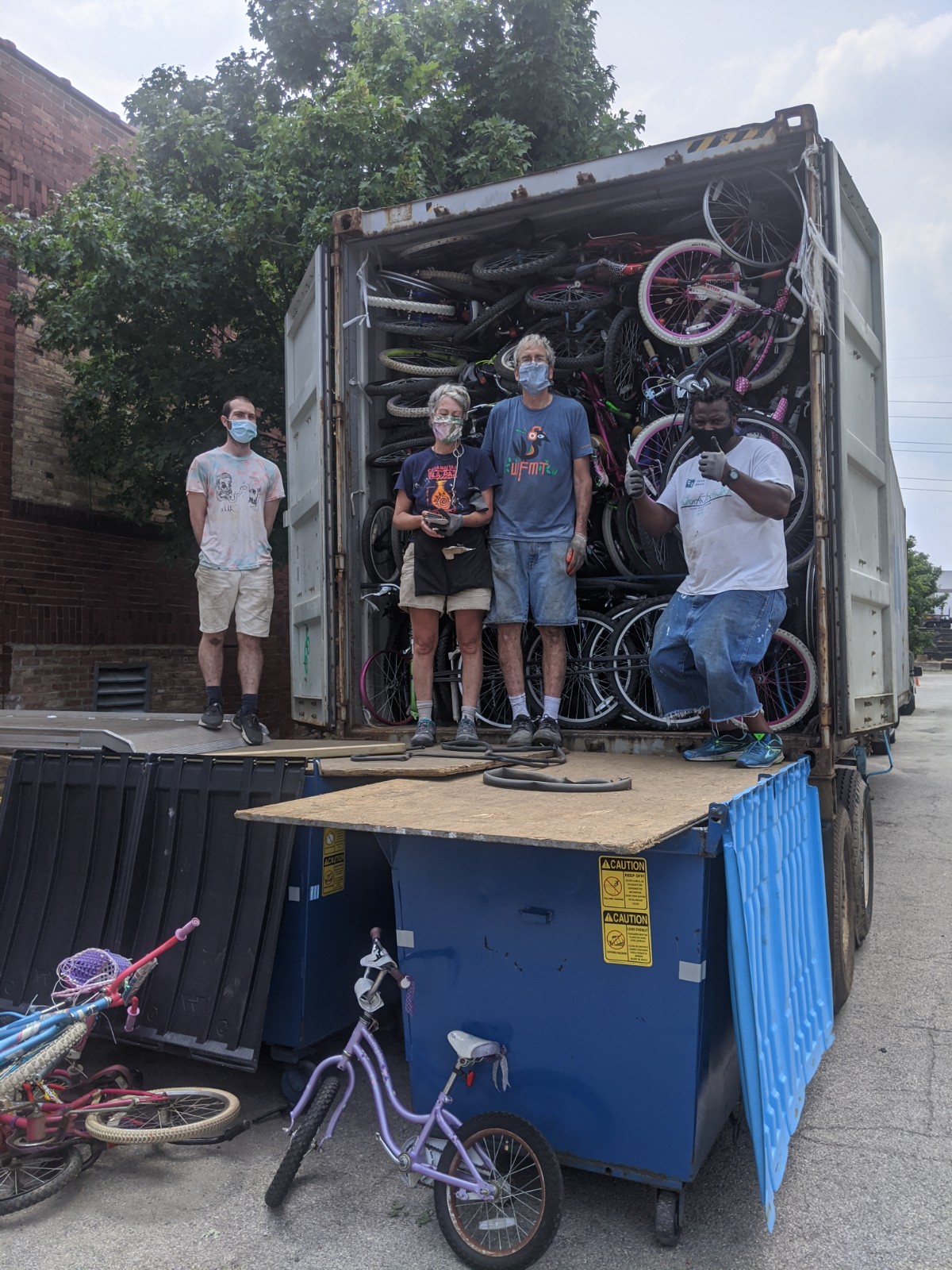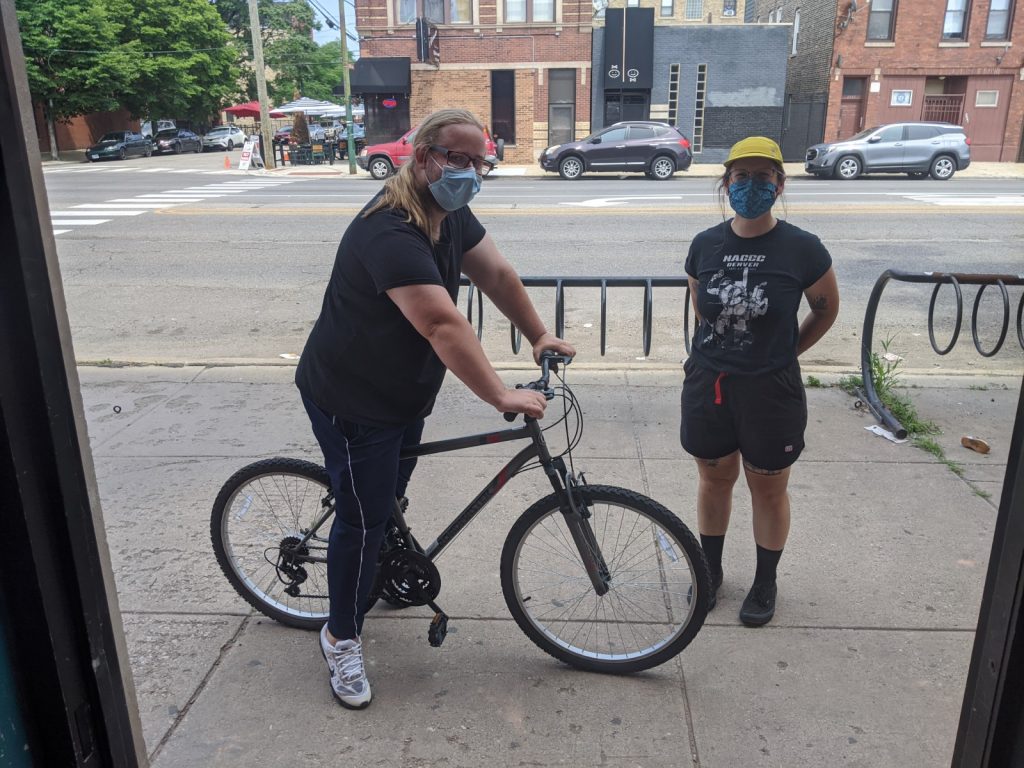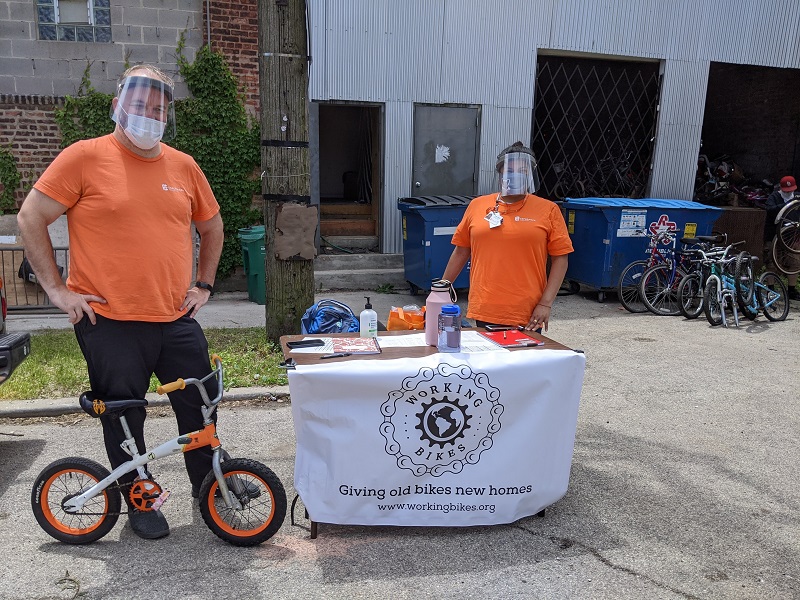Did You Know?
Community bike shops keep cyclists rolling during the pandemic

As more people turn to bicycling as a reliable mode of transportation for commuting and other trips during the COVID-19 pandemic, community bike shops are more vital than ever before.
These nonprofits not only provide affordable repairs and sell used bikes—critical services during the coronavirus crisis—but they also play an essential role in promoting how cycling helps create prosperous, healthy, and equitable communities.
Usually located in historically marginalized neighborhoods, community bike shops are anchors in their communities, serving as hubs that bring diverse people together based on their passion for cycling.
In addition to repairing and selling refurbished bikes, bike parts, and accessories, these bike shops each offer a variety of bicycling programs and services that benefit their communities. They provide youth development programs, teach people how to repair their own bikes, host community rides, and donate refurbished bikes to those in need.
Educate and empower
While the programs they offer differ among community bike shops, their mission is ultimately the same: to encourage more people to ride bikes as their primary mode of transportation and highlight the transformative power of cycling in catalyzing community development.
“Every nonprofit community bike shop each has a different focus. But the goal for all of us is to get as many butts on bikes as we can,” says Mark Frens, program director for Bike N’ Roses, a community bike shop in Belmont Cragin. “We’re all using the bike as a simple educational tool, [demonstrating how the bicycle] offers a healthy way to travel, a way of exploring the city, and gives new opportunities for people [to access jobs and resources] who might not be able to otherwise. We all believe bikes can actually change the world, and we’re trying to get our communities stronger and healthier because of it.”
Bikes N’Roses, for example, offers youth programs that allow teenagers to learn all aspects of operating its bike shop. That includes learning how to repair bikes, interact with customers, and collaborate with their fellow employees with professionalism. The program seeks to provide the students with valuable work experience for their resumes and equip them with life and work skills to succeed in the future.
Blackstone Bicycle Works also provides educational youth programs for kids and teenagers. The Woodlawn-based community bike shop provides free training on bike repair, bicycle safety and advocacy, cycling, and job readiness to about 150 students a year from neighborhoods on the South Side.
The youth programming also includes a tiered apprenticeship program, in which the most advanced participants earn certifications to become professional bike mechanics and are placed in externships at repair shops around the city.
Youth programs also play a big role at West Town Bikes. This community bike shop’s educational programming not only teaches kids about bike repair, but also exposes them to other aspects of bicycling culture. For example, West Town’s Girls Bike Club brings young women and girls together to explore the advantages of bicycling as transportation via weekly activities like group rides and volunteering.
In The 606 Trail Ambassadors program, young adults talk to people walking and cycling along The 606 elevated trail about features of the trail and park system and etiquette tips, as well as hand out educational bike literature. West Town even offers cyclocross training.
Kids and teenagers aren’t the only ones that benefit from West Town’s classes. The community bike shop provides workshops that teach adults about building bikes, bike maintenance, and bike repairs.
The Recyclery in Rogers Park is another community bike shop that provides bicycle repair and maintenance training to both adults and teenagers. It caters some of these open workshops to Spanish-speaking participants and to female and trans cyclists. In addition, volunteers repair used bikes and donate them to local refugees and low-income families as part of its Freecyclery program.
Working Bikes also gives used bikes new life by refurbishing them and donating them to local Chicago nonprofits and global charities that help developing communities around the world. The Little Village nonprofit salvages and sells a huge selection of bikes refurbished by volunteers and professional mechanics, bike parts, and accessories to the public. It uses the proceeds to fund its bike donation program.
Since it was founded in 1999, Working Bikes has donated 70,000 refurbished bikes globally and tens of thousands of bikes in Chicago to people who need them to access job opportunities, healthcare, and other vital resources.
Current struggles under the pandemic
The COVID-19 pandemic has prompted Working Bikes and other community bike shops to reduce or suspend their services at a time when the demand for bikes has skyrocketed. Like most cities around the world, Chicago is experiencing a bicycling boom right now. More people are hopping on two wheels as a safe and affordable way to navigate the city during the crisis, especially for commuting. They are also turning to bikes as a form of recreation that complies with the state’s stay-at-home order.

Unfortunately, community bike shops have been struggling to meet the increased demand for bikes and bicycling education because they have had to adjust their operations during the coronavirus crisis to keep their staff, volunteers, and customers safe. For example, Working Bikes has shifted to online retail sales of its refurbished bicycles and parts, and moved to an appointment-only service model that allows customers to drop off their bikes for repair at specified times.
To meet customer demand for bicycles during the pandemic, Working Bikes needs more donations of used bikes and volunteer mechanics who can refurbish the bikes in their home garages. “We’re selling them as quickly as we can build them,” says Trevor Clarke, executive director of Working Bikes. “We’re still able to produce probably 45 bikes a week, but if you go to store.workingbikes.org, you’ll see the inventory isn’t huge right now. As soon as [a bike] gets posted, it gets sold.”
In addition to needing more used bikes and volunteers, Working Bikes needs cash donations to raise $100,000 for its capital campaign. The nonprofit plans to use the funds to renovate its warehouse and shop. That includes tuck pointing, replacing the roof, and installing solar panels.
“Through all this tumult, we’re trying to make sure that we’re a lasting Chicago institution by shoring up our physical space,” Clarke says. “We were just about to make our capital campaign more public when COVID hit. And though the fundraising has taken a back seat, the work is ongoing.”
Like Working Bikes, The Recyclery has temporarily closed its bike shop. The nonprofit has ceased in-shop educational programming and is only selling bikes by appointment only.
Despite the closure of the shop, The Recyclery has seen a boost in bike sales and continues to donate refurbished bikes to its nonprofit partners.
The nonprofit credits its dedicated volunteers for helping to keep operations running. They have been picking up donations of used bikes, shuttling them to the shop, and delivering the refurbished ones to nonprofit organizations. Other volunteers have been repairing the used bikes at their homes.
“We don’t have any immediate plans to reopen the shop to the public any time soon,” says Kevin Bodkin, a member of The Recyclery’s board. “But we do need knowledgeable mechanics who are able to fix bikes from home and can get involved in repairs for our Freecyclery program. We also need volunteers with the capacity to transport bicycles that can help us collect donated bikes and then get repaired bikes to folks in need. We’re also in need of quality used bikes to fix up for our programs, so anyone willing to host a socially distant bike drive at their home would be a huge help.”
Bikes N’ Roses has been closed for a majority of the pandemic, but it is slowly opening back up. Even though the bike shop continues to suspend the youth programs and will not let the teenage volunteers back into the shop just yet, Bikes N’ Roses is allowing customers to buy the shop’s refurbished bikes and drop their bikes off for minor repairs.
“We’re pretty lucky that we have a really large warehouse space. So when we do have customers come in, it’s pretty easy for them to maintain distance,” Frens says. “We’re a long way from running in-person youth programs or volunteer programs, but we are looking at finding a way to do remote programming in the summer.”
While Bikes N’ Roses has seen bike sales surge since it reopened, the sales spike has not been enough to make up for the revenue it lost when it was closed.
“We lost a good bit of revenue that supports our programs having the shop closed for as long as we did,” Frens says. “So any donation is super helpful. We’re always in need of used bikes. So if anybody has bike sitting in a shed collecting dust or locked up under a porch for a year, we will do something good with it. It will get donated to one of our nonprofits, get refurbished and sold, or donated to someone else in the neighborhood. We badly need used bikes.”
While community bike shops have been struggling during the COVID-19 pandemic, they have also seen it as an opportunity to advance their missions to promote cycling as a sustainable form of transportation that can transform communities.
“We’re entering a phase where the concept of bicycles as a tool is going to be more understood than ever,” Clarke says. “They’re not just a toy. They are functional and empowering.”
“The pandemic has really highlighted the deep-seated flaws we have in our transportation system and how we get around. The fact that we’re so car reliant is not a sustainable thing for the environment and for our public health,” Frens says. “During this pandemic we’re all starting to see that. Community bike shops have been fighting for that sort of transportation equity for forever now. And finally people are starting to see it the way that we’ve been seeing it.”
How to support
- Working Bikes is looking for donations to its capital campaign. It’s also looking for donations of used bikes. And it’s looking for volunteers who can serve as mechanics and other roles.
- To donate to Bikes N’ Roses, please visit its website or email Frens at mark@communitiesunited.org.
- West Town Bikes is accepting donations of money, bikes, and bike related tools and gear.
- Blackstone Bicycle Works is accepting donations on its website.
- Visit The Recyclery website to donate a bike, volunteer, or provide a financial donation.
- We Keep You Rollin’ Bike & Wellness Group is an organization on the far South Side that performs bike education, community bike rides, and bike giveaway programs. The group is currently seeking donations and volunteers to help with its Fifth Annual Legacy Ride on August 29.
Photos courtesy of Working Bikes.
Make a Donation
Your tax-deductible donation supports the important work that Active Trans does throughout the region
